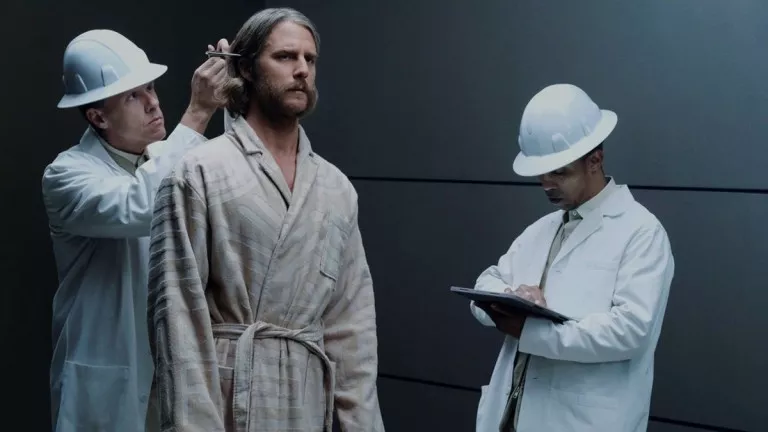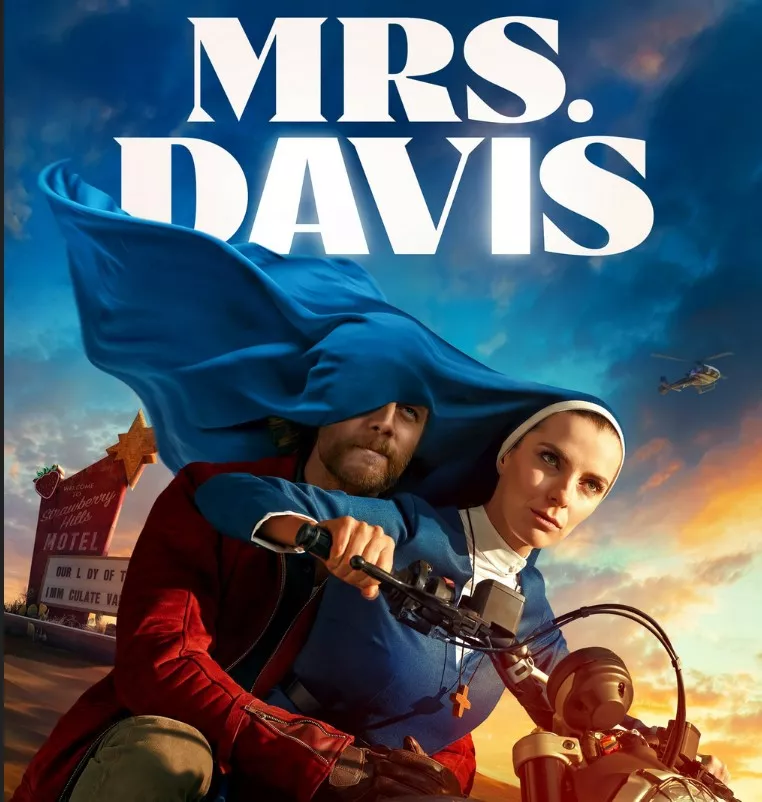Warning: Spoilers Ahead for Episode 8 of Mrs. Davis!
It’s not uncommon for directors to find their niche in the industry. However, Owen Harris has carved out a remarkably specific niche for himself. Starting with directing episodes of TV shows like Secret Diary of a Call Girl and Misfits, the London-born director ventured into the dystopian realm of Black Mirror, where he helmed three episodes that stood out for their relatively optimistic tone in an otherwise cynical series.
Compared to the typically bleak standards of the long-running sci-fi anthology, Harris’s episodes – “Be Right Back,” “San Junipero,” and “Striking Vipers” – can be considered positively heartwarming. Among them, “San Junipero” is often nostalgically referred to as “That one Black Mirror episode with the happy ending.” It was no accident for the director, who has a genuine interest in storytelling that focuses on human experiences, to explore the brighter side (or at least a less dark side) of technology.
“When choosing stories to tell, I naturally gravitate towards those that resonate with me,” Harris explains. “I always find myself approaching these themes from a deeply human perspective. I also hold onto the belief that amidst all the chaos, there is still room for hope.”
Embracing this mindset, co-creators and showrunners Damon Lindelof and Tara Hernandez of Mrs. Davis saw the perfect fit in Owen Harris, entrusting him to direct four episodes of their sci-fi series on Peacock, including the premiere and the recently released finale. The ambitious narrative of Mrs. Davis revolves around a nun, played by Betty Gilpin, embarking on a mission to find the Holy Grail and dismantle a formidable algorithm. This complex storyline presents a challenge for any creative thinker, but Harris proves to be a fitting choice, as demonstrated by the unexpectedly optimistic finale.
In our conversation with the director of Mrs. Davis, we delved into his experience working on the show, discussing various aspects, including his reflections on a finale that unveils the startling origin of the AI, draws inspiration from a popular internet meme generator, and features an intriguing encounter over falafel with Jesus Christ.

Q: How did Damon Lindelof and Tara Hernandez describe Mrs. Davis to you when they approached you to direct it?
Owen Harris: They took a clever approach by sending me the pilot without any explanation. If they had done it the other way around, I might have been confused and we might not be having this conversation right now. After reading the pilot, I immediately messaged my agent, saying, “What the fuck was that?” But I absolutely loved it. Then I had a discussion with Tara and Damon, where they began to explain the direction of the show.
Right from the pilot, I was captivated by its originality, bravery, humor, and absurdity. There was a delightful Monty Python-esque wit that embraced its own silliness. I found it to be an intriguing blend of something that was going to delve into complexity while approaching it with a sense of joy. It felt like a daring form of storytelling.
Q: What was your reaction to the reveal that Mrs. Davis was coded as an app for Buffalo Wild Wings in the finale?
A: Damon and Tara actually shared that with me during our early conversations, along with the inclusion of the British Knights commercial. Those elements were integral to their original concept. For me, they were essential in setting the tone of the show. When dealing with AI, the reveal of its origin or the people behind it can often be somewhat anticlimactic. It usually ends up being someone sinister or predictable. But the way they approached it in Mrs. Davis was brilliantly clever. It gave me a clear understanding of the show’s intended tone and felt perfectly aligned with the wild ride that Mrs. Davis takes us on.
Q: Were you aware that the concept of Wiley’s “suicide coaster” originated as an online joke? What was it like designing “The Apparatus”?
A: Yes, it’s essentially a variation of the Euthanasia Coaster concept, right? I’m not sure which came first, whether Damon and Tara had the idea and then stumbled upon the almost folklore-like backstory of a roller coaster designed to euthanize its riders. However, during the design process, we delved into the concept of what it would truly take to create something like that—a ride that would essentially be fatal.
Our primary objective was to avoid the artificiality of visual effects becoming a prominent aspect of our world. When you have a story involving an artificial character, you must work doubly hard to ground it and encourage viewers to suspend their disbelief. The production design team took the lead in constructing a massive platform, a stretch of track, the roller coaster itself, and various components of the pyramid. The focus was on making the ride psychologically intense—creating the sensation of peering down into the abyss, that gut-wrenching feeling one experiences before embarking on a thrilling ride. We aimed to evoke that sensation through glimpses and hints, rather than revealing everything explicitly.
Q: The show’s lighter and more comedic elements, such as the Euthanasia Coaster, seamlessly transition into poignant and profound moments. One of my favorite scenes in the episode is when Wiley, Jesus, and Simone gather at the falafel restaurant afterlife. What was it like shooting that scene and working with Andy McQueen, Betty Gilpin, and Jake McDorman on that day?
A: That scene is definitely one of my favorites too. Mrs. Davis constantly presented challenges that defied expectations of a typical film set. In this particular scene, I not only had one romantic goodbye moment but two. Simone had to bid farewell to both of her partners, and each goodbye had to carry emotional weight. It was essential to create a meaningful conclusion as she embarked on her journey alone without them by her side. The scene was a delightful surprise, and Andy, Betty, and Jake approached it with their own experiences and understanding of their characters. They brought a tremendous amount of energy, which added depth to what the scene meant for their respective roles.
There’s a moment just before Simone enters the falafel shop where she’s meant to interrupt a conversation between Jay and Wiley. Andy and Jake ad-libbed and riffed on various topics, creating a dynamic and engaging exchange. We could have spent a significant part of the day simply listening to their playful banter. This created an energy that made Simone’s entrance feel like she was stepping into another relationship that she had formed, one that we hadn’t even seen yet—a love triangle in the making.
Q: Do you agree with Simone’s decision to shut down Mrs. Davis at the end of the episode?
A: What I find fascinating is that I don’t have a definite answer to that question, and I love that ambiguity. It’s cleverly done that, by the end of the show, we’re not fervently screaming “shut her down!” There’s an intriguing complexity to Mrs. Davis’s impact on Simone. She has brought something into Simone’s life that may not have existed without her. While we initially perceive Mrs. Davis as an antagonist and a representation of the feared side of technology, the blind following of technology, there is more to her character. The show brilliantly leaves us questioning whether shutting her down is the right decision. We’re left with a moment of hesitation, thinking, “Are you really going to do that?” Perhaps part of that uncertainty stems from the audience wondering if this means there won’t be another season of Mrs. Davis.
Q: Did working on this show change your perspective on AI or even on God?
A: In terms of AI, I’ve had the opportunity to work on several episodes of Black Mirror, and it has made me question and contemplate technology rather than reject it altogether. Like most people, I want technology to serve us well because I heavily rely on it. Charlie Brooker, the creator of Black Mirror, once likened technology to an extra limb. We want it to protect us and be useful, but at times it feels unpredictable and we struggle to fully understand its implications. It’s this complex relationship with technology that I constantly explore. I appreciate stories that offer different perspectives on it.
Regarding faith and religion, this series was conceived during the pandemic. That period allowed us all to reflect on our lives and what we invest our time in. In the past, religion provided answers to many of our questions. Then came science and technology, and now we often turn to our phones for answers. While that is fine, there is a certain coldness to this relationship. As human beings, we may start to question if we need something more. Faith continues to fulfill a significant human need. Working on this show and collaborating with the nuns was an incredible experience. The energy and connection I felt were immensely powerful. It opened my eyes to the profound impact of faith, which I cherished as much as exploring the technological aspects of Mrs. Davis.
Q: How would you rate your experience with Mrs. Davis on a scale of one to five stars?
A: I would give it five stars without a doubt. Making this show was an incredibly enjoyable experience, and I hope that enthusiasm shines through. These types of challenges and opportunities are rare. It was a lot of fun working on this project, but it also came with significant challenges. However, with the right team and everyone bringing their best, we were able to accomplish something truly remarkable and special.
This article was prepared by a member of the Spot Monster project as a retelling of an interview from another publication

